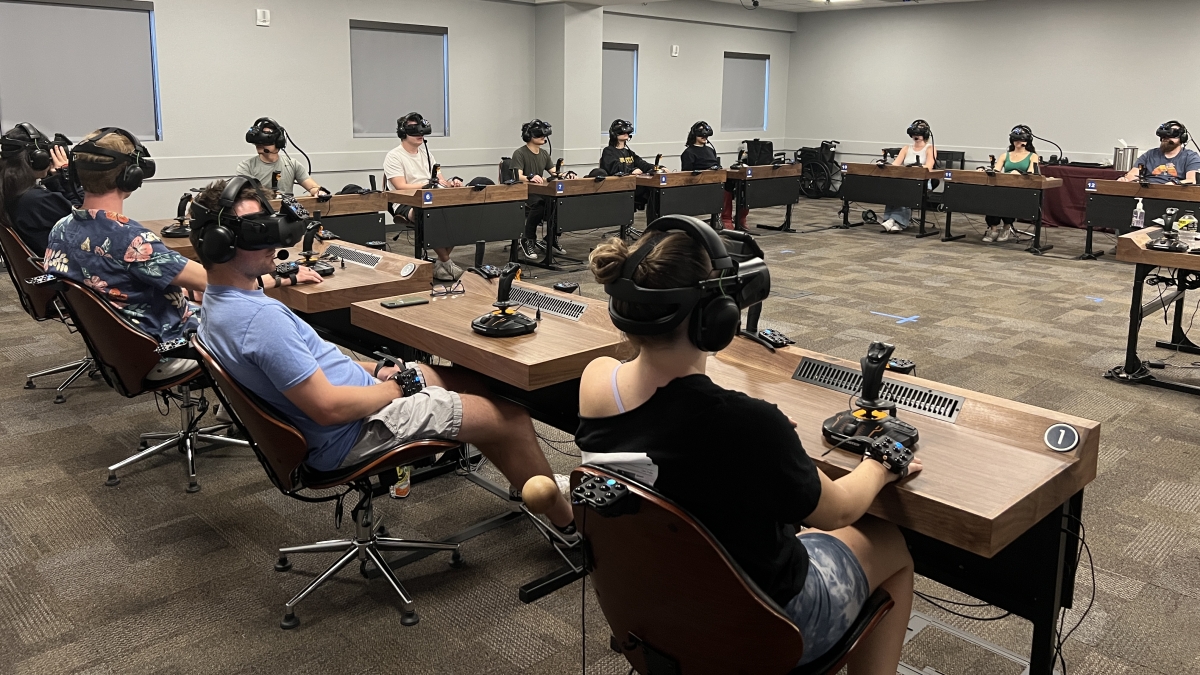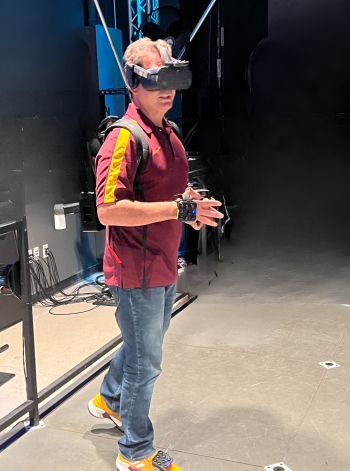VR helps students learn about supply chain management

Students piloting the W. P. Coffee program in Clinical Assistant Professor Antonios Printezis' supply chain management course last fall. Photo by RaeAnn Fox
Editor’s note: This story is featured in the 2024 year in review.
What if students could learn about business challenges and processes from real-world scenarios, while never having to leave the classroom?
Students in Arizona State University's Planning and Control Systems for Supply Chain Management class had the opportunity to do just that while piloting W. P. Coffee, a Dreamscape Learn virtual reality immersive classroom experience last fall.
Set in a virtual coffee shop, the program teaches students about operational capacity management. It allows them to purchase and discard coffee machinery, invest in additional staff to improve efficiency and change the shop's appearance.
At the same time, the simulation provides live updates on how the decisions impact the shop’s finances and net profit.
“Simulations turn theory into experience, making learning a dynamic journey where mistakes become stepping stones to understanding,” said Hailee Griesenbrock, one of the 59 pilot class participants.
“Being able to test out this new form of education was surreal. Every student should get the chance to participate in this form of learning,” she said.
The W. P. Coffee pilot program builds on the business school’s mission to leverage AR (augmented reality) and VR technologies to enhance student learning, and become leaders in using them.
Ohad Kadan, dean and W. P. Carey Distinguished Chair, began collaborating with other W. P. Carey School leadership, academic teams and Dreamscape Learn in 2022 to explore partnership opportunities.
“It was amazing to see how much we were able to accomplish in a year,” said Dan Gruber, associate dean of teaching and learning, who co-leads and co-coordinates the school's faculty- and student-led AR and VR initiatives, alongside Thomas Kull, professor of supply chain management.
Gruber and Kull are part of a Dreamscape Learn community focused on Principled Innovation, one of ASU’s design aspirations.
"This combination of work will become more exciting and lead to broader results and teamwork within W. P. Carey and throughout ASU as time goes on," Gruber said.
“We strived to create a platform for building various learning objectives and modalities while also creating worlds the students could relate to,” Kull said. “Through the W. P. Coffee experience, students should never experience a coffee shop the same way again.”
To prepare for the W. P. Coffee experience, students read a case study by Kelvin Wong, clinical associate professor of economics and executive director of undergraduate programs. While in the simulation, students wore headsets and hand sensors and altered the shop via pop-up displays on their virtual desktops.
Antonios Printezis, clinical assistant professor of supply chain management, talked students through the experience and adjusted shop variables to highlight class learnings from a studio down the hall while wearing a headset, backpack, and hand and foot sensors.
“I think VR has a lot of exciting applications, especially when you can instantly transfer students to places that otherwise may be impractical or impossible to visit,” says Printezis, who taught the pilot class. “It offers opportunities for engagement and motivation by breaking away from traditional in-class learning and placing students in a more immersive and interactive environment.”
Students said the experience helped them better understand and apply concepts learned in class, and the real-world scenario made the experience more relevant.
Incorporating VR into ASU courses
A partnership between ASU and Dreamscape Immersive, Dreamscape Learn merges education and storytelling in a virtual reality format to redefine immersive education and improve outcomes for students across all demographics.
Dreamscape began testing VR experiences for ASU courses two years ago to determine if students not only learned through VR curriculum but enjoyed the learning experience.
“Generally speaking, we found that students loved it,” said Lisa Flesher, chief of Realm 4 Initiatives at Dreamscape Learn and EdPlus.
During this testing period, Dreamscape’s research determined that students enrolled in ASU biology courses with VR curriculum excelled compared with peers enrolled in biology courses without VR experiences, or “business as usual” classes.
“Students were 1.7 times as likely to earn an ‘A’ in the Dreamscape version compared to the business-as-usual version and saw about a full letter grade improvement,” Flesher said.
Immersive classroom experiences like W. P. Coffee take about six months to build. In contrast, VR simulations like ASU’s biology course curriculum, which includes more complex storylines, can take up to two to three years to develop and test.
Read more about Dreamscape Learn at ASU
• Dreamscape Immersive, ASU launch bold partnership to bring cutting-edge virtual reality to learners worldwide
• VR biology lab experience leads to student success
• New personalized biology curriculum prioritizes student success
Dreamscape incorporated VR curriculum into all ASU’s in-person and online Biology 101 and 181 courses as of fall 2022 and all Biology 182 courses as of spring 2023.
The narrative-driven immersive experiences have also made learning more accessible to students from populations that, historically, have been less likely to succeed academically.
“The Action Lab study revealed that gender, race, ethnicity and socioeconomic status did not affect a student's performance in the Dreamscape Learn lab curriculum,” Flesher said. “That’s huge. We’ve never had an intervention like that at ASU.”
Flesher attributes Dreamscape’s success to narrative storytelling, emphasizing compelling, educational stories and scenarios in driving the curriculum. Dreamscape Learn aims to build VR experiences for additional content areas, enroll more students in available VR experiences, and continue collaborating with external partners to build VR curricula.
The ASU Dreamscape team also offers a design course wherein students create VR simulations to develop their storytelling, sound design, coding and animation skills to prepare them for careers in game design and immersive experience building.
“Presenting curriculum in a narrative-driven, engaging way is not how classes are typically structured, especially in STEM,” Flesher said. “Introducing these new elements to let content resonate differently is what we’re diving into.”
Gruber and Kull aim to introduce VR immersive classroom experiences into W. P. Carey courses during the 2024–25 academic year. The simulations — which include a bottling factory, health care facility and boardroom experience, in addition to W. P. Coffee — will continue to be piloted in W. P. Carey courses this spring.
“Implementing technologies like VR and AR alongside traditional learning demonstrates our school’s ability to push the boundaries of education and our commitment to innovative technology teaching methods,” Printezis said.
“To our knowledge, ASU is the only business school using immersive VR classrooms like ours, Kull said. “The technology is all a ‘means to an end,’ and the ‘end’ is access to excellence for all our students and faculty.”
The W. P. Carey School's efforts in VR have been a collaboration among several areas of the business school and many groups across ASU, including Meteor Studios — which helped to build the experiences with a team of students led by Alex Vuong — alongside the Action Lab and EdPlus’ user experience team, which has helped relay the user experience, and many other students, staff, and faculty who have been contributing to this innovation.
“This has been, and continues to be, a tremendous team effort," Gruber said. "Many of the large group meetings that we held have been inspiring in both the range of perspectives shared as well as the collective vision and innovation that has emerged.
"This will only amplify and accelerate as we move our strategic initiative forward."
More Business and entrepreneurship

Boosting entrepreneurship to meet the market's needs
America loves an entrepreneur — the home run king of all businesspeople.And at Arizona State University, we love them, too.Here’s a look at how ASU prepares business students, alumni, development…

ASU Prep program turns students into statisticians through the power of sports
Ask a high school kid if they want to attend a statistics class, and they might give you a blank stare or just laugh.Ask them if they want to go to a professional baseball game and their response…
The business behind the brand
Ask Jennifer Boonlorn ('01 BS in marketing) about the secret to a successful career in the luxury fashion industry and she'll tell you that community building is top of the list."I want to share…


